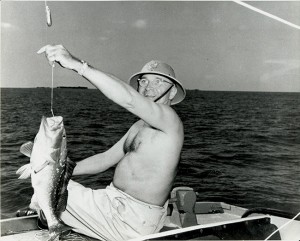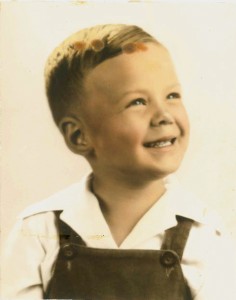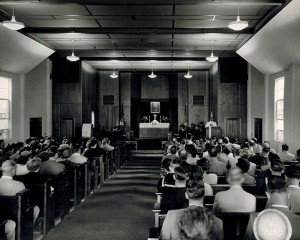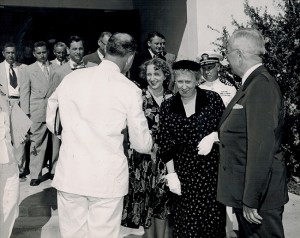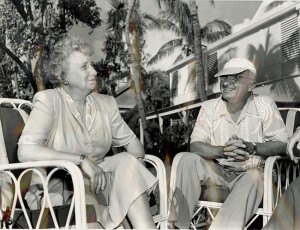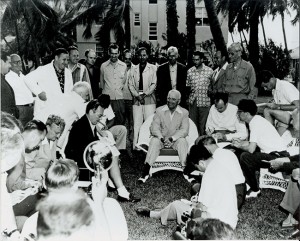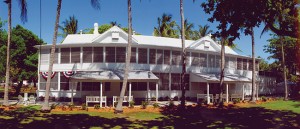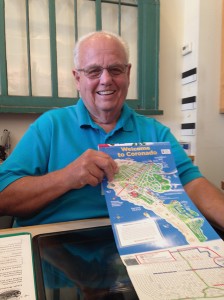This is the story of our nation’s 33rd president, Harry S. Truman, and a young boy who became his “best friend” — at least for a few treasured weeks of the year.
By October 1946, Harry Truman had served as president of the United States for 18 months. He had ordered the dropping of nuclear bombs on Hiroshima and Nagasaki, Japan, after having no knowledge of the weapon when he assumed the presidency on April 12, 1945. He supervised the ending of World War II and worked on the rebuilding of Europe and the creation of a Jewish state in Palestine. As America shifted from a wartime to a peacetime economy, and as the country grappled with life in the nuclear age and the emerging Cold War, the buck had stopped with Harry Truman.
And the buck took a toll on his health.
By late fall of 1946, Truman had developed a lingering cold and migraine headaches, and his physician advised him to rest in the warmest climate he could find in the country. Fleet Adm. Chester Nimitz recommended Quarters A at Key West Naval Station, Florida.
Truman scheduled a weeklong visit there from Nov. 17-23, felt reinvigorated and returned on 10 visits ranging from one week to one month every spring and winter. All told, President Truman spent 175 days at the “Truman Little White House.”
Today, the Truman Little White House, originally constructed in 1890 as naval officers housing, is Florida’s only presidential site and a museum open to the public. In addition to Truman, Presidents William Howard Taft, Dwight D. Eisenhower and John F. Kennedy visited during their terms and former Presidents Jimmy Carter and Bill Clinton sojourned there for rest and relaxation.
Coronado resident Jim Menges recalls the days — in a true-life story that rivals that of the fictional Forrest Gump for being on the frontlines of history — he was pals with President Truman. Just 10 and 11 years old when the president visited Key West in 1951 and 1952, Jimmy, as he was known at the time, was the son of Lt. Cmdr. Harold F. Menges, the Key West base chaplain. Although services were nondenominational, like the president, Chaplain Menges was a Southern Baptist.
Jimmy was an outgoing, curious and friendly lad who freely navigated the Key West base on his bicycle. When he heard the president was visiting, without hesitation he pedaled over to Quarters A to meet him.
He spied the president sitting outside under the oak trees in an Adirondack chair with another gentleman, who quickly blocked his path.
Jimmy politely introduced himself, explained he lived on the base and the president beckoned him over to get acquainted. “He’s the preacher’s kid,” Truman said jovially with a wink to the Secret Service agent.
And the two began their first of many chats. Jimmy was an apt listener and the president freely shared details about his job and his views on issues that likely weren’t so forthcoming with members of the White House staff, press corps or other adults.
One of their first discussions was about fishing. “I heard he had a big boat called the ‘Big Wheel,’ Jim Menges recalled. “I asked him, ‘Are you going fishing?’ He said yes, and he would be sure to invite me to come along. We ended up going fishing five or six times.”
Menges remembers one day when there was a knock at the door of his third grade class at the aptly named Harry S. Truman Elementary School.
“I was the eraser monitor, so the teacher told me to answer the door, which I did,” he said, opening the door and, leaning back into the schoolroom to announce, ‘It’s the president.’
“I can’t remember exactly what she said. I think it was, ‘president of what?’”
But she quickly recovered and soon Truman was sharing a few minutes with the students, explaining that he got headaches up north but Key West had just the right climate to set him straight. “He said he had dropped by to ask his if his ‘best friend, Jimmy’ could go fishing with him,” Menges recalled.
“Do I need to sign a release slip?” the president asked.
“Oh, I think we can trust you,” his teacher replied.
And off they went in Truman’s convertible to board “The Big Wheel,” a 65-foot torpedo retriever that the Navy had converted into a cabin cruiser pleasure boat.
Each trip on the high-powered crash boat would be three or more hours with maybe 15 people on board, often naval officers and members of Truman’s Little White House staff.
On that first trip with Jimmy, the president caught a really big fish. “I think it was a barracuda,” Menges recalled.
Truman’s routine in Key West had far more of a work/play balance than he allowed himself in Washington. Immediately upon arriving in Key West, the former haberdasher would don an open-collared shirt with island motifs such as palm trees, and he insisted his White House staff follow suit. He usually began the day with a morning walk throughout the base and occasionally into town. He’d spend time sunbathing on the beach, and occasionally take a dip into the water. And he spent many hours in the morning and afternoon relaxing, reading, or conversing outside under the oaks.
And that’s where the president and Jimmy shot the breeze on a number of subjects.
“He was against the Second Amendment,” Menges said. “‘Nothing good ever came from someone owning a gun’ was exactly what he said. He told me he thought that only the police and the military should have access to guns and that the only reason we had allowed guns in the first place was because we were forming the colonies and there were Indians who would shoot us with bows and arrows and we needed guns for protection. He said we don’t have any more Indians chasing us.
“And he warned me not to trust politicians, but he said I could trust him. He said politicians are absolutely the most corrupt people on earth. ‘Jimmy if they tell you the sun is out, look for the moon,’ he told me.
“He asked if my dad was planning to stay in the service for 30 years. Did I think he might want to come to Washington? I didn’t tell him that my dad didn’t vote for him and he didn’t want to come to Key West at first. When Adm. Stump called him, he told the admiral that he didn’t even vote for Truman. But my dad came to like the president, and they formed a strong bond.”
Truman had a long extension line that could be brought out to the trees, but the phone would ring inside the house. As unbelievable as it seems by today’s standards, there would sometimes not be a Secret Service staffer on duty to answer it. So the president recruited Jimmy to answer the phone.
“I was told to always answer, ‘President Truman’s quarters; Jimmy Menges speaking. How may I help you?’ And then I would either take a message for the president or let him know who was calling. He’d tell me in advance if he wanted to take the call.”
One call was memorable.
“I was over at Harry’s place one Saturday morning and the phone rang and the Secret Service guy wasn’t up yet.
“I always called the president ‘Harry,’” Menges said. “My dad chastised me when he heard about that. ‘You can’t call the president by his first name.” he said. “He’s the most powerful man in the world!’ So I offered to call him ‘Mr. President’ but he said he liked me calling him Harry.
“So one day when I was over at Harry’s, the phone was ringing and I got up there just in time to answer it and the president said, ‘Just take a message.’
At first, the caller was cordial, inquiring who Jimmy was, and identifying himself as a friend of the president, but growing more agitated when he was told the president was not available.
“I said, ‘Please tell me who you are and what it’s in reference to,’” Menges said.
Menges starts chuckling as he recalled the irate reply. “This is General McArthur, dammit, I’m in the Pacific, and I need to speak to him now!”
Jimmy said he’d relay the message and put him on hold.
“So I told the president that a General McArthur was calling and that he sounded like a nice guy at first but then he started yelling at me.
“And then the president leaned back in his chair and slapped his forehead. ‘I’ve got to do something about that guy,’ he said. ‘He’s got to go!’ And then he took the call.
“Harry didn’t like McArthur one bit. He told me, ‘He invaded the wrong side of the Philippines.’” The following month, Truman relieved McArthur of command of U.S. forces in Korea.
Today, Menges ponders what led to his unlikely bond with the president. “You know, he never had a son and his only daughter Margaret was an aspiring opera singer who was often on the road with her mother. So the president didn’t really have anyone he could talk to.
“And I’ve always been a good listener. I think he would have liked to have had a son.”
Through Truman, Chaplain Menges and his family also got to know former Prime Minister Winston Churchill, who visited Key West.
“He had a speech impediment,” Menges said. “When I first met him he reached out his hand and tried to ask my name but he sputtered, and I could tell he was having difficulty, so I reached out my hand and said, ‘Hi, I’m Jimmy.’ And I could tell he was grateful. He smiled and said, ‘Thanks!’”
When Chaplain Menges was transferred to Bremerhaven, Germany, the Churchills invited the entire family to visit them at Chartwell, their estate about two hours southwest of London, and to attend the June 2, 1953, coronation of Queen Elizabeth at Westminster Abbey.
“It was a huge, rustic home,” Menges remembered. “And we got to sit in the sixth row at the coronation.”
Next stop was Hawaii for the Mengeses, and Jim, now 16, stepped aboard the USS Nautilus for a “Tiger Cub” event when the world’s first nuclear-powered submarine came to Pearl Harbor during its maiden Pacific voyage.
“There was a guy sitting on the bridge in a corner,” Menges said. “He was wearing white pants and shoes and a Hawaiian shirt. I relaxed with him for a few minutes and I asked him about the sub. Apparently, I was asking some fairly intelligent questions because he asked me about school and my plans for college. ‘Have you ever thought about going to the Naval Academy? I might be able to give you a recommendation,’ he offered.
“I told him thanks, but my friend Harry said he’d be able to get me an appointment to any of the academies I wanted.”
“‘Harry?’ the man inquired.
“Just then my dad walked in and my new friend introduced himself. ‘Hi, I’m Adm. Rickover.’” As in Adm. Hyman Rickover, the father of nuclear propulsion.”
Today Menges, a retired building contractor, volunteers one day a week at the Coronado Visitor Center and also volunteers as a gardener at the Coronado Police Department.
You might want to strike up a conversation with him.
